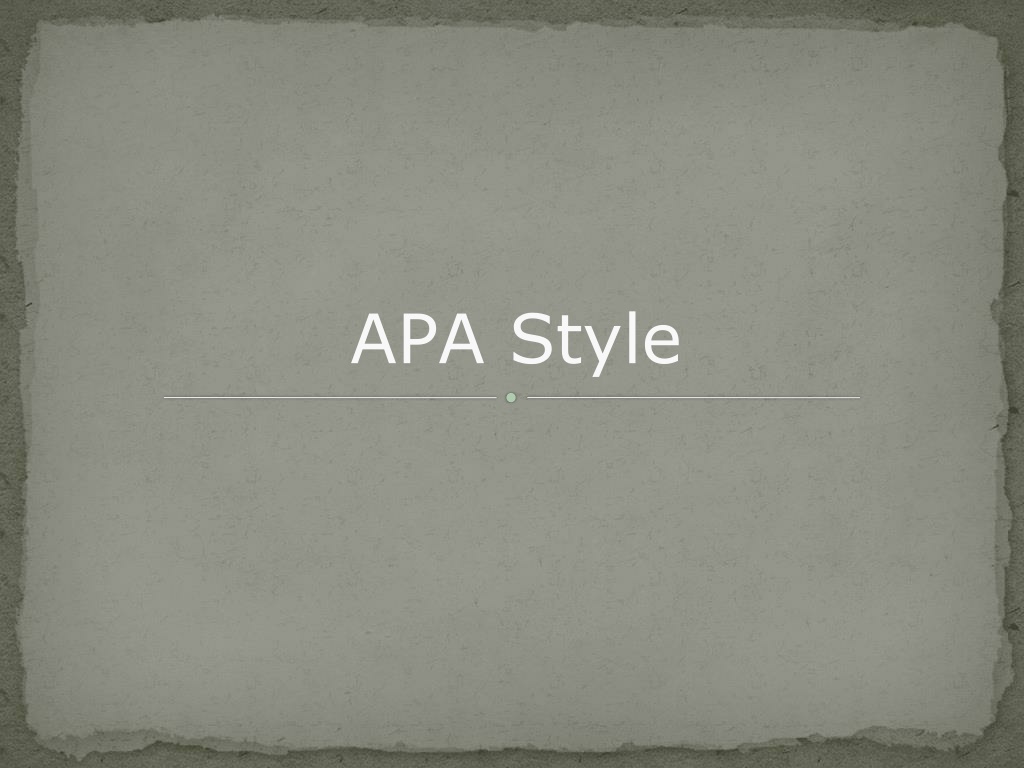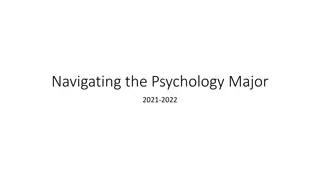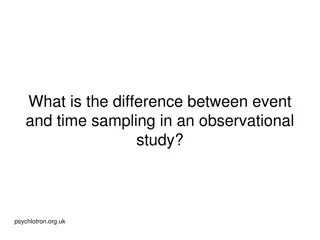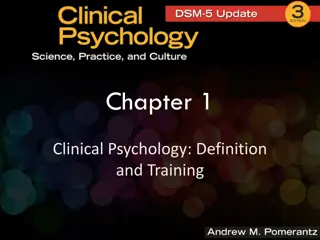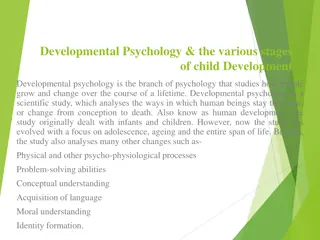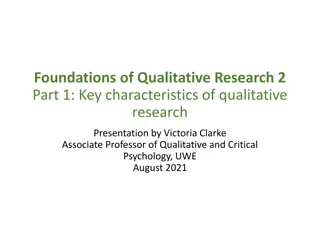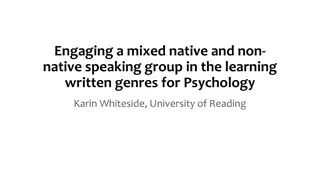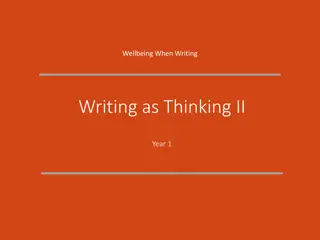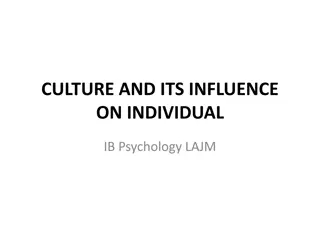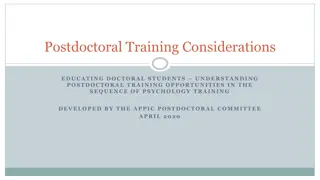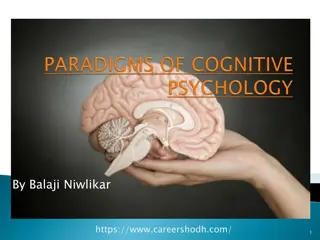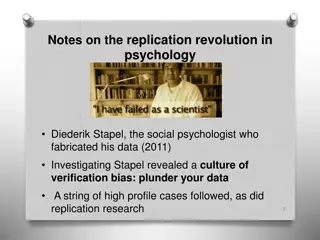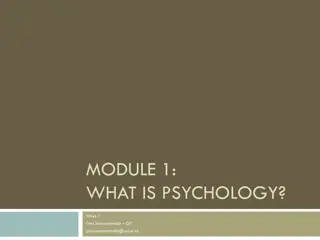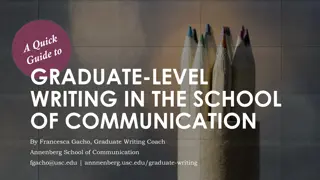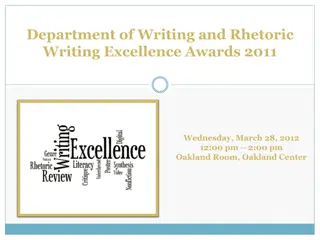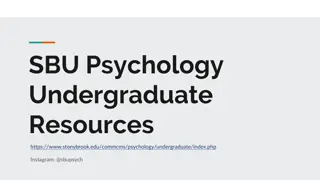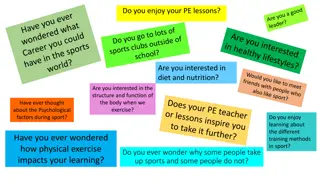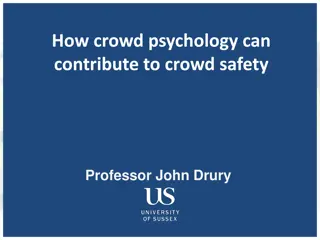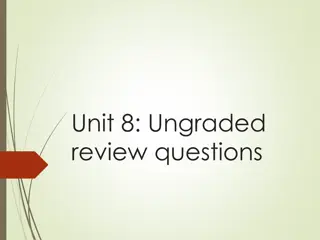Effective Writing Strategies in Psychology Research
Learn effective writing strategies in psychology research, including APA style guidelines, avoiding wordiness, using jargon wisely, addressing biases in language, making precise word choices, avoiding anthropomorphism, structuring sentences effectively, and more for clear and concise communication.
Download Presentation

Please find below an Image/Link to download the presentation.
The content on the website is provided AS IS for your information and personal use only. It may not be sold, licensed, or shared on other websites without obtaining consent from the author. Download presentation by click this link. If you encounter any issues during the download, it is possible that the publisher has removed the file from their server.
E N D
Presentation Transcript
Psychology Writing Styles Technical, functional, utilitarian No flowery, but flows Short, to the point sentence No heavy use of commas or complex passive sentences
Wordiness They were both alike A total of 68 participants Four different groups completed Has been previously found The reason is because Understanding that this is a common emotion
Wordiness After the initial testing, researchers were aware that children preferred red cars more than they preferred to blue cars. Research indicated children preferred red cars to blue cars Children may have a preference for the color red based on the fact that children preferred red cars Children may prefer red cars because they have a preference for the color red Instructions, which were exactly the same as those used The same instructions as those used
Jargon Jargon is wordiness Overly specific, scientific language Need to be inclusive to non-experts Public, media friendly content Grade five level
Bias in Language Gender Sexual Orientation Race Subjects vs. Participants Sex vs. Gender Mental Illness Depressed people, people with depression Schizophrenics, people with schizophrenia
Word Choice Restriction That vs. Which Tests that were perceived difficult Tests which were perceived difficult Informal definitions Feel vs. Think Since vs. Because While vs. Although Colloquial Expression Quite a lot Write up for report
Anthropomorphism The study, the results, the measure, the experiment, the findings etc. CANNOT argue, state, discover, find, question, investigate, be interested, etc. Findings can suggest Result tables can show and indicate
Sentence Structure Comparisons Shy children were more gifted at math Shy children were more gifted at math than non-shy children 10 year olds were more likely to play with same aged peers than 8 year olds 10 year olds were more likely to play with same aged peers than to play with 8 year olds
Verb Choice Previous studies in past tense Findings and relations that are still true in present tense Hypotheses for what will be found in past tense Make verbs within a paragraph match
Modifiers Place modifiers next to the word they are modifying These data only provide a partial answer These data provide only a partial answer
Dangling Modifiers Passive and vague After separating the participants into groups, students were tested After separating the participants into groups, the researchers tested the students The names were both difficult to pronounce and spell The names were difficult to both pronounce and spell Both of the names were difficult to pronounce and spell
Parallel Construction Children were asked to take their shoes, backpacks, crayons, and their pencil cases Children were asked to take their shoes, their backpacks, their crayons and their pencil cases Researchers examined the performance of subjects that completed the first task and the second task Researchers examined the performance of subjects that completed the first task and the performance of subjects that completed the second task
Parallel Construction Students were told to make themselves comfortable, to read the instructions, and that they should ask about anything that they did not understand Students were told to makes themselves comfortable, to read the instructions, and to ask about anything they did not understand
Being Punctual Sentences are separated by 2 spaces after each period Commas should not be overused Semicolon separate two independent clauses Punctuation marks . , ? ! go inside quotation marks Are shy boys at greater risk?
Spelling Canadian spelling for STU essays, theses American spelling for APA journal manuscripts, international conferences Neighbour, colour, labour, behaviour
Capitalization Titles of essays capitalize only the first letter of the first word, and the first letter of the first word that comes after a colon Too shy to achieve? Clarifying the relation between shyness and academic achievement Too Shy To Achieve? Clarifying The Relation Between Shyness And Academic Achievement
Using Numerals Numbers >= 10 The remaining 10% 65 years old Numbers that precede a measurement 5mg dose Any number being compared 2ndand 11thgrade students Numbers that are statistics 1stquartile References to page or table numbers See Table 2
Spelling Numbers Number < 10 that do not indicate a statistic Repeated the task three times Seven measures of achievement Eight items on each survey Numbers that begin a sentence or heading Forty-eight percent of the sample... Fifteen participants
In-Text Citations (Hughes, 2008) Hughes (2008) found that shy children... (Hughes & Coplan, 2008) Hughes and Coplan (2008) found shy children (Hughes, Coplan & Rubin, 2008) (Hughes et al., 2008) Hughes and colleagues (2008) found shy...
Quotes Don t use! Shyness is a temperamental characteristic (Hughes, 2008:43) Anything broad or general on in your own words should be cited, not quoted Only use quotes for a ground breaking definition, or a neat comparison from a cornerstone study
References Hughes, K. & Coplan, R. J. (2010). Too shy to achieve? Clarifying the relation between shyness and academic achievement. Journal of Imaginary Psychology, 43(2), 115-134.
Reference List Alphabetize by first author, then by second author(s), then by year. Hughes, J. (2010). Hughes, K. (2003). Hughes, K. (2009). Hughes, K. & Arbeau, K. (2004) Hughes, K., Arbeau K. & Coplan, R. J. (2004) Hughes, K., Coplan, R. J., Arbeau, K. & Weeks, M. (2010)
